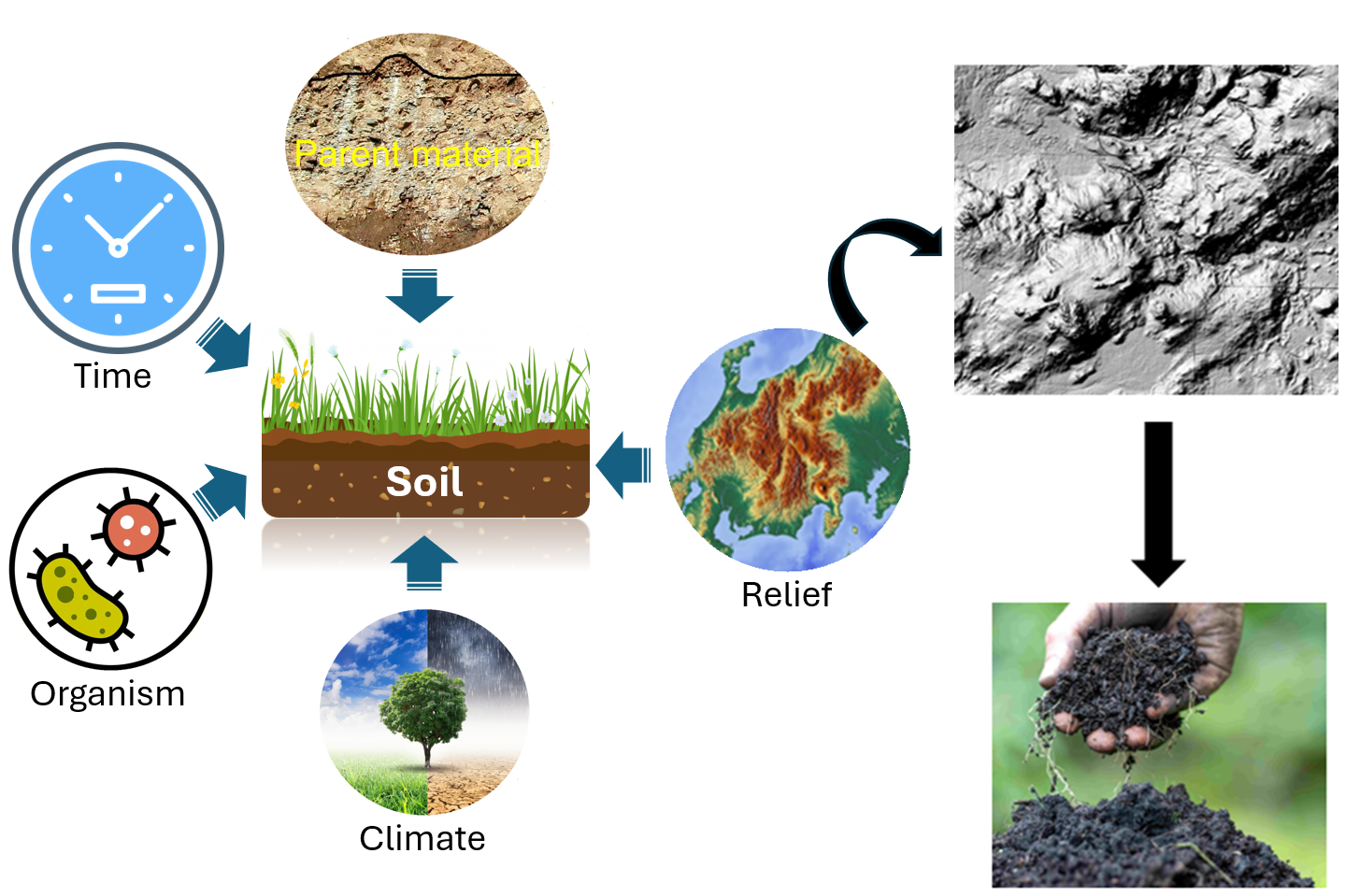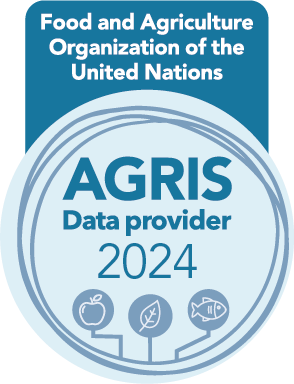LiDAR imagery-based relief interpretation for soil organic carbon (SOC) estimation in the Quaternary Sumbing and Tertiary Kulon Progo Volcano Transition Zone, Central Java, Indonesia
DOI:
https://doi.org/10.17268/sci.agropecu.2025.046Palabras clave:
Relief, LiDAR, soil organic carbon, volcanic transition zoneResumen
Typically, the transition zone of quaternary and tertiary volcanoes is a potential area for agricultural development but is prone to landslides. Landslide occurrences and the use of former landslide zones exhibit a distinct soil organic carbon (SOC) distribution, necessitating analysis to sustain agricultural output. Laboratory SOC measurements on landscape size are not expedient, necessitating the development of an estimating method for representation. This study aims to analyze the relationship between relief and SOC using LiDAR (Light Detection and Ranging) data. LiDAR acquisition was carried out to identify relief units as units of analysis. Soil sample measurements were carried out in the laboratory with the parameters analyzed including pH, Bulk Density, Moisture Content, Organic Carbon, Organic Matter, N-total, CN Ratio and Cation Exchange Capacity. The results showed that SOC and relief had R2 = 0.89 in the upper layer (0 – 20 cm) and 0.86 in the lower layer (20 - 40 cm). Relief has a high correlation with soil characteristics at the top and bottom of soil depths. It is because of relatively stable elevation and relatively dynamic land cover that SOC is spread out in a clustered way. This research can be used as a basis for agricultural land management, especially in areas prone to landslides.
Citas
Abebe, M. H., Gebremichael, D., & Haile, M. (2025). Soil properties under different land uses and slope gradients: Implications for sustainable land management in the Tach Karnuary watershed, Northwestern Ethiopia. Frontiers in Environmental Science, 13, 1518068. https://doi.org/10.3389/fenvs.2025.1518068
Anggraeni, R., Mahrup, M., Kusnarta, I. G. M., & Silawibawa, P. (2022). Variasi regim lengas dan suhu tanah pada lahan yang mengalami penutupan awan rendah berbasis peta terra modis di pulau lombok. Journal of Soil Quality and Management, 1(1), 7-15. https://doi.org/10.29303/jsqm.v1i1.9
Belandina, N., Abolla, C., Maulana, E., Setiawan, M. A., Haryono, E., Harini, R., Sartohadi, J., Argian, R., & Putri, P. (2025). Agricultural land optimization to supports sustainable shallot production on fluvial and structural landforms. Ecological Engineering & Environmental Technology, 26(3), 183–194. https://doi.org/10.12912/27197050/199801
Dong, J., Zhou, K., Jiang, P., Wu, J., & Fu, W. (2021). Revealing horizontal and vertical variation of soil organic carbon, soil total nitrogen and C:N ratio in subtropical forests of southeastern China. Journal of Environmental Management, 289, 112483. https://doi.org/10.1016/j.jenvman.2021.112483
Elaksher, A., Ali, T., & Alharthy, A. (2023). A Quantitative Assessment of LIDAR Data Accuracy. Remote. Sens., 15, 442. https://doi.org/10.3390/rs15020442
Fauziah, L., Hanudin, E., & Utami, S. (2022). Competitive adsorption of phosphate with sulfate, humic acid, and fulvic acid by allophane in different parent materials in Central Java. Ilmu Pertanian (Agricultural Science), 7(2), 121-131. https://doi.org/10.22146/ipas.72050
Gerke, J. (2022). The Central Role of Soil Organic Matter in Soil Fertility and Carbon Storage. Soil Systems, 6(33). https://doi.org/10.3390/soilsystems6020033
He, J., Zhang, Y., Liu, M., Chen, L., Man, W., Fang, H., Li, X., Yin, X., Lian, J., Bai, W., & Li, F. (2025). Prediction of soil organic carbon content in Spartina alterniflora by using UAV multispectral and LiDAR data. IEEE Journal of Selected Topics in Applied Earth Observations and Remote Sensing, 18(4), 4895–4910. https://doi.org/10.1109/JSTARS.2025.3534238
Hu, L., Huang, R., Zhou, L., Qin, R., He, X., Deng, H., … & Li, K. (2023). Effects of magnesium-modified biochar on soil organic carbon mineralization in citrus orchard. Frontiers in Microbiology, 14. https://doi.org/10.3389/fmicb.2023.1109272
Huang, J., Xia, T., Shuai, Y., & Zhu, H. (2023). Assessing the Performance of GEDI LiDAR Data for Estimating Terrain in Densely Forested Areas. IEEE Geoscience and Remote Sensing Letters, 20, 1–5. https://doi.org/10.1109/LGRS.2023.3306875
Huang, X., Ibrahim, M. M., Luo, Y., Jiang, L., Chen, J., & Hou, E. (2024). Land Use Change Alters Soil Organic Carbon: Constrained Global Patterns and Predictors. Earth’s Future, 12(5), 1–16. https://doi.org/10.1029/2023EF004254
Kim, Y. J., Jung, J. Y., & Mishra, U. (2021). Managing Soil Organic Carbon for Climate Change Mitigation and Food Security. In Soil Organic Carbon and Feeding the Future, 1st edition, 25–46. CRC Press. https://doi.org/10.1201/9781003243090
Kołodyńska‐Gawrysiak, R., Gawrysiak, L., Poesen, J., & Plak, A. (2023). The impact of natural closed depressions on soil organic carbon storage in eroded loess landscapes of east poland. Land Degradation & Development, 34(17), 5273-5292. https://doi.org/10.1002/ldr.4843
Kutsch, W. L., Bahn, M., & Heinemeyer, A. (Eds.). (2010). Soil Carbon Dynamics: An Integrated Methodology. Cambridge: Cambridge University Press.
Li, Q., Li, A., Dai, T., Fan, Z., Luo, Y., Li, S., Yuan, D., Zhao, B., Tao, Q., Wang, C., Li, B., Gao, X., Li, Y., Li, H., & Wilson, J. (2020). Depth‐dependent soil organic carbon dynamics of croplands across the Chengdu Plain of China from the 1980s to the 2010s. Global Change Biology, 26, 4134-4146. https://doi.org/10.1111/gcb.15110
Liptzin, D., Norris, C. E., Cappellazzi, S. B., Mac Bean, G., Cope, M., Greub, K. L., ... & Honeycutt, C. W. (2022). An evaluation of carbon indicators of soil health in long-term agricultural experiments. Soil Biol. Biochem., 172, 108708. https://doi.org/10.1016/j.soilbio.2022.108708
Miloš, B., & Bensa, A. (2016). Fractal analysis of spatial variability of organic carbon in anthropogenic soils. Case study: Kastela Bay, Croatia. Agriculture and Forestry, 62(1), 373-381. https://doi.org/10.17707/AgricultForest.62.1.39
Mulyani, O., Machfud, Y., & Solihin, M. (2023). Fungsi hubungan sifat kimia tanah dan penggunaan pestisida dengan kandungan kadmium pada lahan sawah. Jurnal Agrikultura, 34(2), 315. https://doi.org/10.24198/agrikultura.v34i2.46370
Paz Salazar, M., Villarreal, R., Alberto Lozano, L., Florencia Otero, M., Guillermo Polich, N., Lautaro Bellora, G., Germán Soracco, C., & María Paz, S. (2020). Soil organic carbon. Stratification and spatial variation of different fractions in an Argiudoll under no tillage. Revista de la Facultad de Agronomía, La Plata, 119(2), 1–11. https://doi.org/10.24215/16699513e053
Priyono, K. D., Sunarto, J. Sartohadi, & dan Sudibyakto. (2011). Tipologi pedogeomorfik longsorlahan di Pegunungan Menoreh Kabupaten Kulonprogo, Daerah Istimewa Yogyakarta. Forum Geografi, 1, 67-84.
Qiao, Y., Wang, J., Liu, H., Huang, K., Yang, Q., Lu, R., Yan, L., Wang, X., & Xia, J. (2020). Depth-dependent soil C-N-P stoichio-metry in a mature subtropical broadleaf forest. Geoderma, 370, 114357. https://doi.org/10.1016/j.geoderma.2020.114357.
Rasel, S. M. M., Groen, T. A., Hussin, Y. A., & Diti, I. J. 2017. Proxies for soil organic carbon derived from remote sensing. International Journal of Applied Earth Observation and Geoinformation, 59, 157–166. https://doi.org/10.1016/j.jag.2017.03.004
Sartohadi, J., Suratman., Jamulya & Dewi, N. I. S. (2012). Pengantar Geografi Tanah. Pustaka Pelajar.
Satriawan, H., Fuady, Z., & Mayani, N. (2017). Soil conservation by vegetative systems in oil palm cultivation. Polish Journal of Soil Science, 49(2), 223. https://doi.org/10.17951/pjss.2016.49.2.223
Setiawan, T., Isnaini, S., Asghaf, N., & Effendi, I. (2019). Karakteristik interaksi air - CO2 - CaCO3 dan analisis sistem aliran air tanah karst musim kemarau di kab. gunungkidul, daerah istimewa yogyakarta. Riset Geologi Dan Pertambangan, 29(2), 171-183.
Slessarev, E., Chadwick, O. A., Nuccio, E., & Pett‐Ridge, J. (2021). Rock weathering controls the potential for soil carbon storage at a continental scale. Biogeochemistry, 157(1), 1-13. https://doi.org/10.1007/s10533-021-00859-8
SNI 7724. (2011). Pengukuran dan penghitungan cadangan karbon, Pengukuran lapangan untuk penaksiran cadangan karbon hutan (ground based forest carbon accounting). BSN. Jakarta.
Turner, A. (2018). Social and environmental impacts of landslides. Innovative Infrastructure Solutions, 3, 1-25. https://doi.org/10.1007/s41062-018-0175-y.
Wu, S., Chui, T., Chen, L., & Chow, C. (2023). Modelling sediment trapping in vegetative filter strips on steep slopes. Hydrological Processes, 37(1). https://doi.org/10.1002/hyp.14793
Zhang, G., Chen, Q., Zhao, Z., Zhang, X., Chao, J., Zhou, D., Chai, W., Yang, H., Lai, Z., & He, Y. (2023). Nickel grade inversion of lateritic nickel ore using WorldView-3 data incorporating geospatial location information: A case study of North Konawe, Indonesia. Remote Sensing, 15(15), 3756. https://doi.org/10.3390/rs15153756
Zhao, X. F., Gao, S., Lu, D., Chen, X., Feng, W., Wang, Y., … & Wang, H. (2021). Analysis of mechanisms of soil potassium‐holding capacity using different soils of china. Agronomy Journal, 114(1), 825-834. https://doi.org/10.1002/agj2.20961

Descargas
Publicado
Cómo citar
Número
Sección
Licencia
Derechos de autor 2025 Scientia Agropecuaria

Esta obra está bajo una licencia internacional Creative Commons Atribución-NoComercial 4.0.
Los autores que publican en esta revista aceptan los siguientes términos:
a. Los autores conservan los derechos de autor y conceden a la revista el derecho publicación, simultáneamente licenciada bajo una licencia de Creative Commons que permite a otros compartir el trabajo, pero citando la publicación inicial en esta revista.
b. Los autores pueden celebrar acuerdos contractuales adicionales separados para la distribución no exclusiva de la versión publicada de la obra de la revista (por ejemplo, publicarla en un repositorio institucional o publicarla en un libro), pero citando la publicación inicial en esta revista.
c. Se permite y anima a los autores a publicar su trabajo en línea (por ejemplo, en repositorios institucionales o en su sitio web) antes y durante el proceso de presentación, ya que puede conducir a intercambios productivos, así como una mayor citación del trabajo publicado (ver efecto del acceso abierto).




